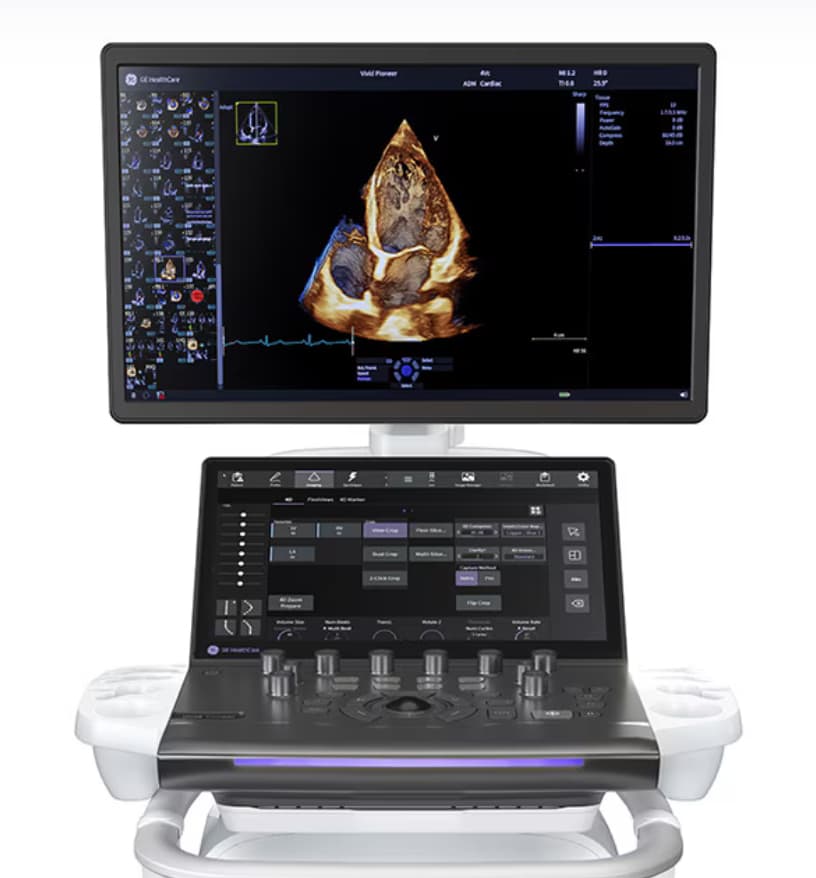GE HealthCare launches premium AI-powered cardiovascular ultrasound
GE HealthCare has announced the launch of its most advanced cardiovascular ultrasound system, the Vivid Pioneer, featuring next-generation AI automation and enhanced imaging capabilities designed to transform cardiac diagnostic workflows. The ultra-premium system has received both CE Mark approval and U.S. FDA 510(k) clearance, positioning it for global deployment in cardiovascular care settings.
Revolutionary imaging architecture delivers clinical precision
The Vivid Pioneer harnesses the next-generation cSound Pioneer architecture combined with sophisticated probe technology to deliver exceptional cardiac imaging across multiple modalities. The system produces enhanced spatial and contrast resolution, improved colour sensitivity, and remarkable 4D imaging capabilities that enable clinicians to visualise fine anatomical structures with unprecedented accuracy.
“Vivid Pioneer is built to meet the moment in cardiovascular care where precision, speed, and accuracy are essential,” said Jyoti Gera, Chief Executive Officer, CardioVascular and Interventional Solutions, Advanced Visualisation Solutions at GE HealthCare. “With its next-generation imaging engine, AI-powered automation, and intuitive design, the goal of Vivid Pioneer is to empower clinicians to see more, do more, and address patient needs with comfort and confidence.”
AI acceleration transforms diagnostic workflows
The system’s standout feature is its dramatic improvement in AI performance, delivering up to 360% faster processing compared to previous generations. This enhanced computational power drives a comprehensive suite of intelligent automation tools designed to reduce inter-operator variability and accelerate clinical workflows across all experience levels.
Key AI-driven features include the newly introduced AI Cardiac Auto Doppler for automated measurements, Easy AFI that provides strain results and ejection fraction analyses in less than nine seconds, and 4D Auto LHQ for comprehensive left heart function assessment. These automated capabilities represent a significant advancement in reducing manual processing requirements whilst maintaining diagnostic accuracy.
Clinical validation demonstrates paediatric and adult applications
Dr. Ferran Roses, Head of Pediatric Cardiology at Vall d’Hebron University Hospital in Barcelona, Spain, highlighted the system’s clinical impact: “Vivid Pioneer is a fantastic new machine because it brings two very important things for my patients, as a paediatric cardiologist: The first one is extremely good image quality, and the second one is automatic quantification modes for most of my workflow so I can do my scanning very quickly. The new features allow us to see in much more detail and to diagnose more precisely.”
Enhanced ergonomics reduces scanning fatigue
Beyond its imaging capabilities, the Vivid Pioneer incorporates ergonomic design principles featuring a simplified user interface, larger display screen, and customisable touch panel to support workflow continuity and reduce scanning fatigue. The compact form factor enables navigation in constrained clinical environments, from echo laboratories to bedside applications.
The integrated battery system ensures uninterrupted workflow during room-to-room transitions and provides up to five minutes of scanning capability during power interruptions, with instant resume functionality that eliminates rebooting delays.
Addressing global cardiovascular disease burden
The launch addresses a critical clinical need, as cardiovascular diseases remain the leading cause of death worldwide, accounting for nearly one-third of all global deaths. The asymptomatic nature of many cardiovascular conditions in early stages creates significant diagnostic challenges, making advanced imaging capabilities essential for early detection and consistent monitoring.
The Vivid Pioneer utilises advanced XDclear technology through its 4Vc-D and new 6Sc-D probes, enabling comprehensive cardiac function assessment across patient populations from paediatric to adult cases.
The system was demonstrated at the European Society of Cardiology 2025 conference, that took place August 29–September 1 in Madrid, Spain.
- For more information, visit: https://www.gehealthcare.com/products/ultrasound/vivid/vivid-pioneer


